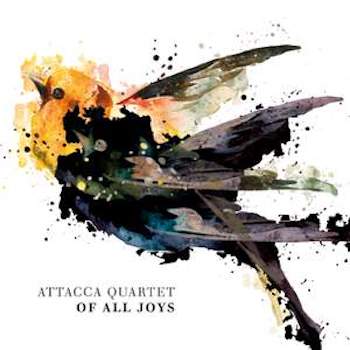Classical Album Review: Attacca Quartet’s “Of All Joys” — Crafting a Space All its Own
By Jonathan Blumhofer
Taken together, the selections on Attacca Quartet’s latest release is something of a meditation on the human condition.
 Of All Joys, the Attacca Quartet’s latest release (Sony Classical), is, perhaps, misleadingly titled: its name hails from a John Dowland lute song that decrees “And tears and sighs and groans my weary days/Of all joys have deprived.” This, in turn, explains the album’s playlist, which is largely reflective and melancholy – though certainly suffused by more than a few shafts of light.
Of All Joys, the Attacca Quartet’s latest release (Sony Classical), is, perhaps, misleadingly titled: its name hails from a John Dowland lute song that decrees “And tears and sighs and groans my weary days/Of all joys have deprived.” This, in turn, explains the album’s playlist, which is largely reflective and melancholy – though certainly suffused by more than a few shafts of light.
Indeed, the program is striking: relatively recent (read 1977-‘90) pieces by Arvo Pärt and Philip Glass are paired with arrangements of 16th-century-ish songs and instrumental works by Dowland, Orlando Gibbons, Luca Marenzio, Gregorio Allegri, John Bennet, and Jacobus Clemens. Taken together, they result in something of a meditation on the human condition.
At the heart of the recording is Glass’s 1985 String Quartet no. 3, Mishima. Utilizing his music for the eponymous film, it’s one of the composer’s finest pieces. Here, the Attacca’s performance is conspicuously purposeful.
Rhythmic and articulative uniformity, as well as sensitive dynamic contrasts, result in a reading that really lives on the edge. In the third movement, for instance, the Attacca’s ensemble blend is such that every line speaks as it should; the movement’s climaxes are intense and explosive. Accordingly, the last two movements offer moments of cathartic release – and the finale’s coda ends with the same wispy textures with which the first movement begins.
Marenzio’s Solo e pensoso, Dowland’s Flow My Tears, and Gibbons’ Fantasia in D minor preface the Glass. Each anticipates it in some way(s).
In Solo e pensoso, resonant melodic lines and harmonic progressions over its outer thirds frame an elegantly dancing middle. The Dowland is subdued and sober – though, like the Glass, rhythmically strong and purposefully done. And, in the Gibbons, the Attacca’s underline the biting dissonances of the music’s first part before delivering a spirited, sonorous account of its second half.
The remaining older scores follow Mishima.
Allegri’s Miserere is played with a gripping inward focus that includes some surprising bent notes. Regardless, its central climax is mighty, the ending purgative. Bennet’s Weep, O Mine Eyes and Clemens’ Ego flos campi offer, as a kind of respite, moments of unalloyed beauty: joy tinged with sorrow, certainly, but joy, nonetheless.
Framing all of this are Pärt’s two essays.
Summa provides a stately, but flowing, introduction to the proceedings. Meanwhile, Fratres comes across – thanks to the Attacca’s interpretation and its context in the program – as a sort of hypnotic, cleansing ritual.
The whole effort, then, is arresting. This is an album for our times, yes; but it seems to be one that takes a much broader view and, in so doing, manages to exceed them, crafting a space all its own. Warmly recommended.
Jonathan Blumhofer is a composer and violist who has been active in the greater Boston area since 2004. His music has received numerous awards and been performed by various ensembles, including the American Composers Orchestra, Kiev Philharmonic, Camerata Chicago, Xanthos Ensemble, and Juventas New Music Group. Since receiving his doctorate from Boston University in 2010, Jon has taught at Clark University, Worcester Polytechnic Institute, and online for the University of Phoenix, in addition to writing music criticism for the Worcester Telegram & Gazette.

